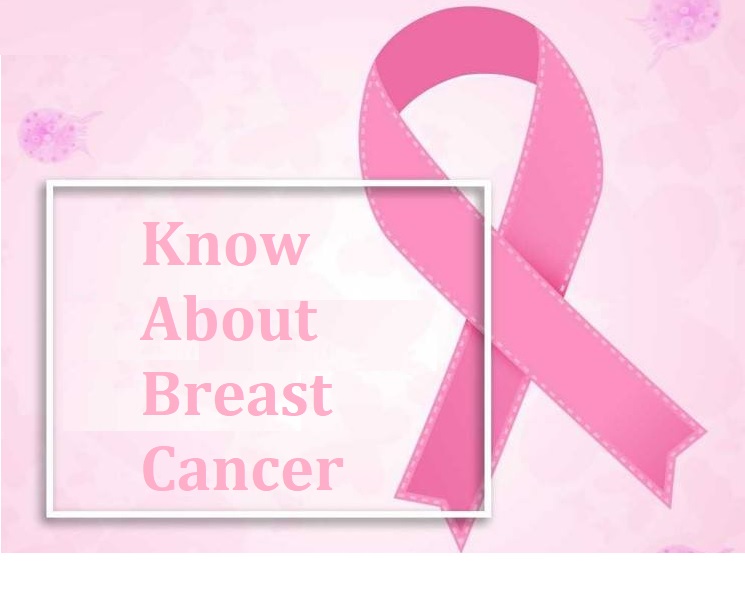Estimated to affect 1 in 20 women at some point in their life, breast cancer is a condition that starts in the breast’s cells. Same as any type of cancer, breast cancer is when abnormal cells grow uncontrollably. This cancer usually starts in a tiny, confined area of the glands that create milk or in the ducts that take it to the nipple. Cancer can undergo bigger growth in the breast and reach other organs through the bloodstream or to neighboring lymph nodes through the lymphatic channels. Cancer may grow as well as attack tissue, such as the skin surrounding the breast or the chest wall.
Being a malignant tumor, breast cancer is the second most common cancer that affects Indian women. Though mostly found in women, breast cancer can also affect men. As staying aware of the disease is important, here is more information about breast cancer that you should know:
Types of Breast Cancer

There are several types of breast cancers that grow and spread at varying rates. Some grow and spread at a faster rate whereas some take years to extend to the outer area of the breast tissue. Different types of breast cancer include:
• Angiosarcoma
• Lobular Carcinoma in Situ (LCIS)
• Inflammatory Breast Cancer
• Invasive Lobular Carcinoma
• Paget’s Disease of the breast
• Recurrent Breast Cancer
• Ductal Carcinoma in Situ (DCIS)
• Male Breast Cancer
Symptoms of Breast Cancer
In case one has breast cancer, there are certain changes that they may be able to notice in their breasts, including:
• A lump or thickening in the armpit or the breast. Generally, the lump is firm, irregularly-shaped, and may get stuck to the deeper tissues present within the breast or the breast’s skin
• The breast’s shape and size may change
• Puckering as well as dimpling of the skin of the breast that is affected (same as an orange peel; ‘Peau-d-orange’ appearance)
• Inward turning of the nipple of the affected breast may occur
• Nipple discharge (mostly bloody, however, other chronic discharge also requires investigation)
• The breast’s skin may become scaly, swollen, or red
Breast Cancer Risk Factors
These are some of the most common risk factors for breast cancer:
• Gender: As compared to men, women are at a higher risk. However, breast cancer also affects men.
• Age: The risk of breast cancer increases with age.
• Family history: The risk increases if one has close blood relatives, like mother, daughter, or sister, who had breast cancer.
• Post-menopausal hormone therapy: Women who take hormone therapy medicines to treat the symptoms of menopause have a greater chance of developing breast cancer. The risk reduces when they no longer take these medicines.
Other Risk Factors
• Obesity
• Drinking and smoking
• Women who do not have any children
• Women with no history of breastfeeding
Investigations
The following are the investigations that can be carried out to detect breast cancer:
• Core biopsy
• Mammogram
• Fine Needle Aspiration Cytology (FNAC)
• Ultrasonogram
• Magnetic Resonance Imaging (MRI)
Early Detection
The chances of a successful treatment improve if breast cancer is detected at an early stage. Early detection tests involve mammograms and self-examination. Self-examination takes only a few minutes and a woman can carry out self-examination to assess any symptoms. These tests play a key role in saving the lives of thousands every year.
Treatment for Breast Cancer
• Chemotherapy
• Surgery
• Hormone therapy
• Radiotherapy
The type of treatment will vary depending on the size and location of the tumor and on the patient’s general health condition.
Breast Conservation Surgery
Breast conservation surgery is performed with an aim to remove breast cancer while avoiding a complete mastectomy. Under this procedure, the removal of the lump with a section of the neighboring normal tissue is generally done. Fat from the armpit is also cleared. After this, the patient undergoes radiotherapy. In case a mastectomy has been carried out, the patient has the choice to opt for breast reconstruction surgery. In this procedure, the breast can be reconstructed by using foreign material or tissues from the patient.
Prevention

A sure way does not exist for the prevention of breast cancer. But if these lifestyle modifications are observed, one can certainly reduce the risk of breast cancer as well as of other types of cancer:
• Maintaining a healthy Body Mass Index (BMI)
• Staying physically fit with the right amount of exercise
• Following a healthy diet inclusive of lots of fresh fruits as well as vegetables
• Avoiding excessive alcohol consumption
Preventive surgery can be an option for women who are at high risk. For this, risk needs to be recognized and established with the help of exhaustive genetic make-up assessments as well as relevant consultations.
Outlook
With the right treatment, a woman who is diagnosed with stage 1 or stage 0 breast cancer has an almost complete chance of survival for a minimum of 5 years. But, if the diagnosis of breast cancer takes place at stage 4, their survival chances for another 5 years decrease to 22%.

Early detection is key for proper treatment. Regular screenings, as well as health checks, can be helpful in the early detection of symptoms of breast cancer. Women must discuss various screening options and schedules with their doctor.
To know more about the “Breast Cancer”, watch the below-mentioned video by Dr. Shefali Agrawal, from Apollo Hospitals, New Delhi.


